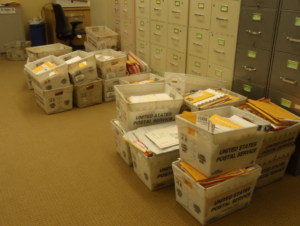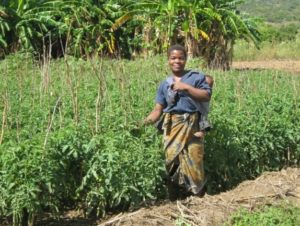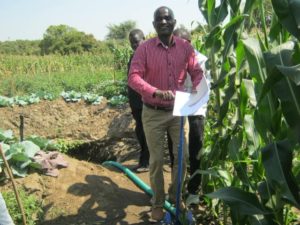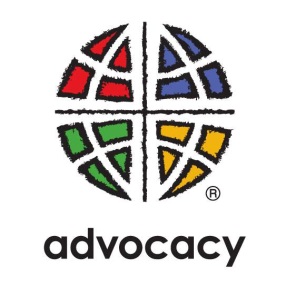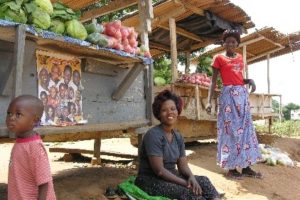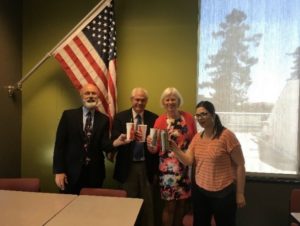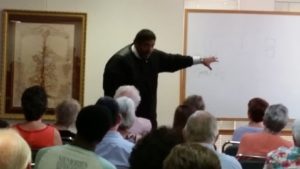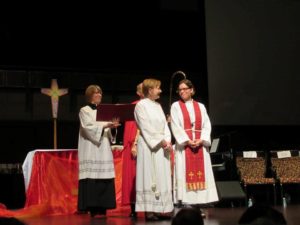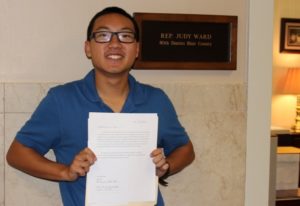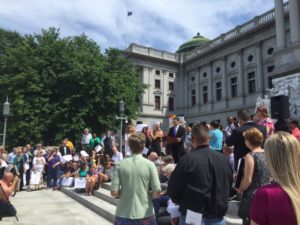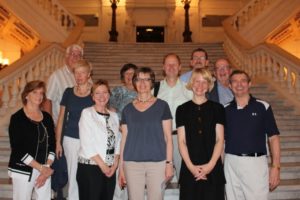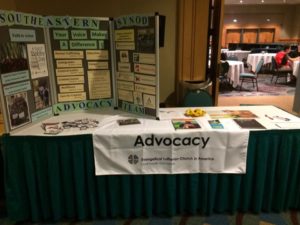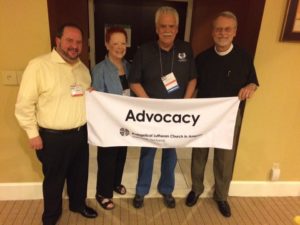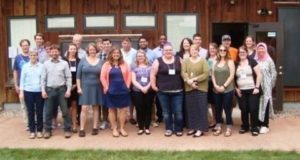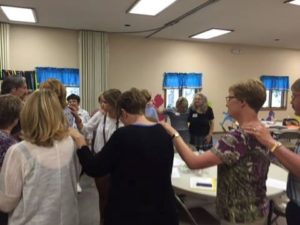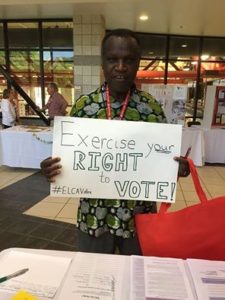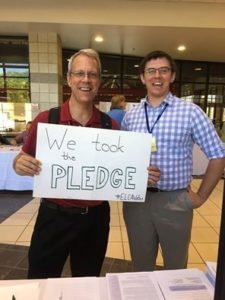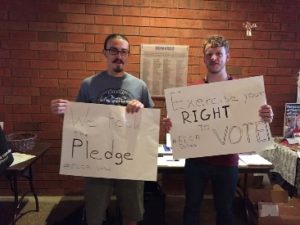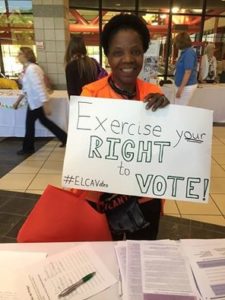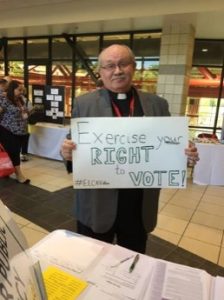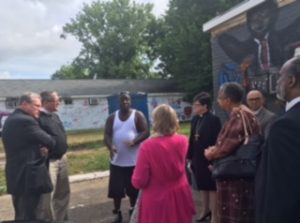
Group listening to Jamal a local community member and friend of Alton Sterling.
The recent shootings, arrests, custody and deaths of African American people by majority white law enforcement has become all too familiar. On any given day, a viral video becomes the breaking news story. Just days after the shooting of Alton Sterling in Baton Rouge, Louisiana a young African American man named Philando Castile took his last breaths live streamed on Facebook. The video footage captured by Castile’s fiancée, shows him fatally shot during a routine traffic stop. A recent report compiled by a group of experts stated that too often people of African descent “experience discrimination in accessing justice, and face alarmingly high rates of police violence.” The shootings of Alton Sterling and Philando Castile are not just about them alone. It is about the continuous lived experience of racial inequities inherent throughout the entire criminal justice system. It is about the communities of color that continue to cry out to be heard, set ablaze when they feel invalidated and march in protest as a sign of racial solidarity. City by city, the names may change (Tamir Rice, Sean Bell, Michael Brown, Oscar Grant, Eric Garner, Walter Scott, Freddie Grey and so many others) but the stories and the outpouring of despair from African American communities remain the same.
When it comes to racial and socioeconomic segregation, Baton Rouge is not unlike any other major U.S. city. Just pick a city… any city. Racial segregation driven by social, economic and political underpinnings have carved up American cities along racial lines. As a southern city, Baton Rouge, has a historical past of overt racial injustices put in place during the Jim Crow era of segregated laws. During the civil rights era, Baton Rogue’s black citizens staged the nation’s first bus boycott in 1953. In 1963 black residents attempted to integrate the city’s public park swimming pool. Their actions were met with so much resistance that the white establishment filled the pool with cement to deny access to blacks. Today the city still remains racially and socioeconomically divided. The racial composition of Baton Rouge is 55% black and 40% white. Florida Avenue, is the city’s main thoroughfare–it serves as a physical boundary between of racial and socioeconomic segregation. North of Florida Avenue is represented by the predominantly African American community. North of Florida avenue is the community of Alton Sterling. The homes aren’t as big. Employment scarce for many of the residents. South of Florida Ave is primarily wealthy, white and suburban–the median income is $30,000 higher than that of the neighboring north of Florida avenue community.
In 2016, People of African descent globally, are still considered the most marginalized among racial groups. Limited access to quality education, health services, housing, social security and experiences of mass incarceration are a common reality. Statistically, African American males are six times more likely to experience incarceration than white males. Racial disparities exist within every aspect of the criminal justice system through racial profiling, biased enforcement, length and terms of sentencing and the option of treatment. The Evangelical Lutheran Church in America is called to be church together for the sake of the world. We have confessed and committed to confront racism in the social statement Freed in Christ: Race, Ethnicity & Culture adopted by the 1993 ELCA Churchwide assembly and The Church and Criminal Justice: Hearing the Cries social statement adopted at the 2013 ELCA Churchwide assembly. The ELCA has confessed that racism (structures of power and privilege that favor whites as a whole and disproportionately causes harm to people and communities of color) pervasively infects and affects all aspects of U.S. society. The ELCA has confessed that “persistent inequalities based on race, ethnicity, gender and class, frequently challenge the [criminal] justice system’s implementation of –and perhaps even its commitment to basic principles of justice.”
In response to the shooting of Alton Sterling and Philando Castile, this church of three expressions, (churches, synods & Churchwide organization) heard the call to be a ministry of presence in community during this time of trial in our nation. A delegation from the Churchwide organization traveled to Baton Rouge to meet with synodical and congregational leaders on the ground. Texas-Louisiana Gulf Coast synod Bishop Michael Rhinehart, Rev. Blair Lundborg, Assistant to the Bishop, Rev. Chris Markert Director for Evangelical Mission, Pastor Robin McCullough-Bade, Executive Director of the Interfaith Federation of Greater Baton Rogue, Rev. Mike Button of St Paul Lutheran in Baton Rouge, Rev. Kim Little-Brooks, Lutheran Church of Our Saviour in Baton Rouge. Rev. Nancy Andrews, conference dean and interim pastor at Bethlehem Lutheran Church in New Orleans. From the Churhwide office, Presiding Bishop Elizabeth Eaton, Rev. Dr. Stephen Bouman, Domestic Mission Unit Executive, Rev. Albert Starr, Director for Multicultural Ministries/African Descent Ministries, Rev. Brenda Smith, Program Director for Faith Practices and the Book of Faith & Judith Roberts, Program Director for Racial Justice.
We gathered together as a church of three expressions to respond to a national crisis that has rocked the city of Baton Rouge and rippled across this country. The first response from the Chuchwide office was to support synod leadership on the ground through prayer and conversation in Baton Rogue. The shooting of Alton Sterling, is not the first time synod Bishop Michael Rhinehart has responded to headline news story involving a person of color and violent encounters with law enforcement. On July 13, 2015, Sandra Bland, a 28-year-old African American woman was arrested, detained and found dead three days later in a jail cell in Waller, Texas after a routine traffic stop. The Bland family and so many voices across the country continue to grieve, seek answers and accountability in her death. Bishop Rhinehart remains present in community prayer vigils in remembrance of Sandra Bland.
We believed that as a church sent for the sake of the world–the ministry of presence is about showing up in the community. Presence is also about accompaniment; we came to listen to voices and stories from the community. The third step is to discern where and how God is calling the church to respond. Domestic Mission Unit Executive Director, Rev. Dr. Stephen Bouman knows about the need for the church to respond. Bouman served as Bishop of Metro N.Y synod during the attacks on the World Trade Center. “I learned the importance of the ministry of presence after the towers fell in New York. Two things happen by instinct. We wanted to pray and ritualize. We didn’t want to be alone. To have caring human beings show up and the share the heat of the day is a deep spiritual gift. Incarnation means the real God takes on real flesh in the real world. The message of presence is that God is there. The message of persistent presence is that God will not leave until healing begins.” said Bouman.
Our first stop in Baton Rouge, was at the Triple S convenience store at the site of the shooting of Alton Sterling. Upon arrival, we were greeted by a young man named Jamal. He appeared to be in his mid-30’s— close in age to Alton Sterling. Jamal has been holding vigil at the site since the shooting on July 5, 2016. We experience his heartfelt welcome. It is evident that this isn’t his first conversation with strangers. He recounts the events of that day in great detail. Two large murals in the image of Alton Sterling have been spray painted on the Triple S convenience store exterior. A table adorned with flower, photos and mementos replace the music Cd’s that Alton Sterling once sold. Soon, we are greeted by other African American men ranging in age from teenagers to older adults. Full time, gainful employment seems scarce for many adult black males’ north of Florida avenue. The men stop and talk with us about the day of the shooting, relationships with local law enforcement and the feelings of despair within the community. Rev. Brenda Smith reflects that, “Going to Baton Rouge reinforced that sometimes—all people need to know is that you are listening. Whether that is in sharing pain or what they think should happen next…. or reflecting on the past experiences of racism. People need an outlet. The situation may not change immediately but you can sense the feeling of relief.”
Our day on the ground in Baton Rouge continued with a meeting with Bishop Robert W. Muench of the Roman Catholic Diocese of Baton Rouge, followed by an ecumenical gathering with local clergy. Our experiences ranged from prayers that were offered to conversations about racial reconciliation. Bishop Rhinehart thanked the team for traveling to Baton Rouge. He said, “It was a blessing to be accompanied by and feel the support of Bishop Eaton and members of the Churchwide Organization. We felt the presence of the whole church with us.”
A few short days following our trip to Baton Rouge, our experience would be overshadowed by the killing of 3 Baton Rouge police officers on a Sunday morning by a lone African American male shooter. Again the city was confronted with violence, law enforcement and race once again. News of the Baton Rouge, shooting came on the heels of a sniper attack in Dallas, TX that killed 5 officers and left several wounded just days earlier. Again, bringing the nation to confront race relations, violence and law enforcement. On Saturday, July 23, 2016—the ELCA in all three expressions, in the ministry of presence joined the people of Dallas, TX for a prayer vigil service in honor of the slain officers.
These last few days and weeks, have been trying times in this nation. Lately the pain and images of death and violence have become all to consuming for too many of us. Yet in this time of grief, frustration and confusion, I am reminded even more of the power of presence and the witness of the church. The words were spoken clearly from a street preacher at the Triple S convenience store in Baton Rouge. He said, “The church must be present in the streets. It cannot simply protect buildings and watch over offering plates.” The power of a ministry of presence isn’t just about going to transform it is also about being transformed through relationships guided by the power of the Holy Spirit.
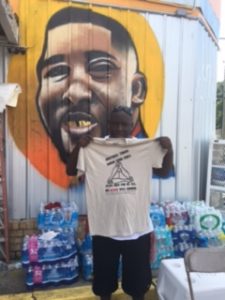
Jamal at the Triple S Convenience Store. T-shirt reads “Brothers Throw Down Your Guns!
Jesus Died For Us All. His Blood Was Enough.”


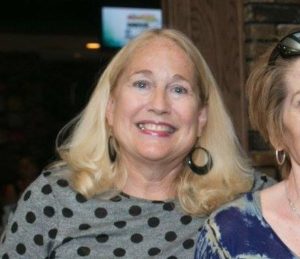 My name is Donna Wiegel, and I’ve been part of the Youth Gathering staff since 1997. Heidi Hagstrom, the former Gathering director, and I came on board together, when the Gathering moved from Minneapolis to become part of the ELCA churchwide organization’s ministry. Prior to working for the Gathering, I worked with Women of the ELCA for 5 years in a similar capacity – registration and housing.
My name is Donna Wiegel, and I’ve been part of the Youth Gathering staff since 1997. Heidi Hagstrom, the former Gathering director, and I came on board together, when the Gathering moved from Minneapolis to become part of the ELCA churchwide organization’s ministry. Prior to working for the Gathering, I worked with Women of the ELCA for 5 years in a similar capacity – registration and housing.